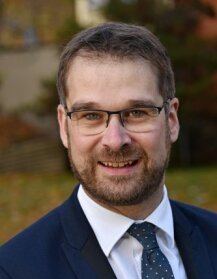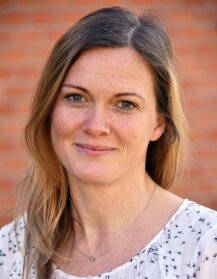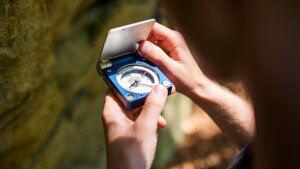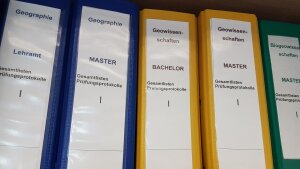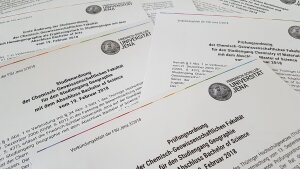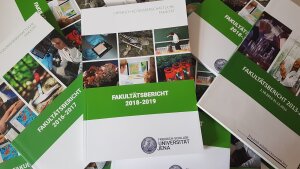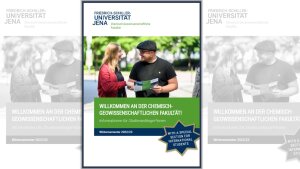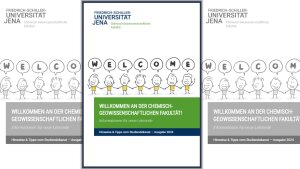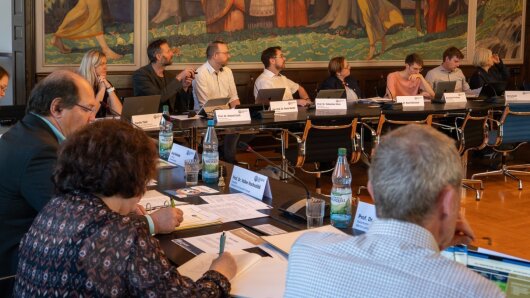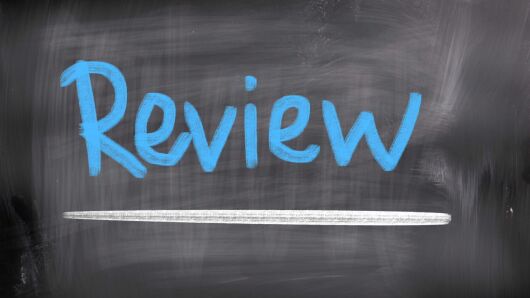
Information around studying and teaching
-
1. Changes in module descriptions – from the idea to realisation
1. Please always use the current module descriptions in Word format and track changes (Word documents are available in the Office of the Dean of Student Affairs).
2. For reasons of quality assurance, all changes must pass various committees of the faculty. This takes time, usually one year!
3. Changes in module descriptions are discussed twice a year in the Office of the Vice-President for Learning and Teaching: in December (effective in the following winter semester) and in June (effective in the following summer semester).
-
2. Thuringian Ordinance on Teaching Obligations at Universities (Thüringer Lehrverpflichtungsverordnung - ThürLVVO)
The Thuringian Ordinance on Teaching Obligations at Universities (Thüringer Lehrverpflichtungsverordnung - ThürLVVO) applies to the employment of academic staff with teaching responsibility.
The amendment of 19 May 2020 was supplemented by an university handout on the implementation of the ThürLVVO with regard to the creditability of team teaching, theses and digital teaching on the teaching load.
The faculty adopted an internal implementation on 6 July 2022, which was approved by the Vice-President for Learning and Teaching.
Important documents
- Current valid version of the ThürLVVO (in German only)External link
- Implementation of ThürLVVO at the CGF (in German only)This link requires a loginde (URZ login required)
- Application for the implementation of digital teachingExternal link – please submit approx. 2 weeks before implementation
- Notification of team teachingExternal link – please submit approx. 2 weeks before implementation
-
3. Information on the accreditation of the study programmes at the CGF
The Friedrich Schiller University Jena is system-accredited de. In the future, the quality assurance system of the faculty will be enhanced by including periodic programme reviews de. For this purpose, all study programmes of the faculty are bundled in subject clusters and examined by an external assessment every eight years.
The conclusion of the cluster review is associated by a discussion between the Executive Board and the Faculty of Chemistry and Earth Sciences and the agreement of further actions. These finally form the basis for the accreditation decision for all degree programmes within in the cluster of the faculty.
Overview of upcoming programme reviews in clusters at the CGF
- Subject cluster 1 Geography: 03/2023 - 02/2025
- Subject cluster 2 Earth Sciences: 09/2024 - 08/2026
- Subject cluster 3 Chemistry: 05/2025 - 04/2027
Further information
On the website of the German Accreditation Council, you will find an overview of all accredited study programmes and higher education institutions in GermanyExternal link (the database is available in German only).
-
4. Examiner's handbook
The Examiner's handbook contains procedures and instructions for examiners and representatives of the Faculty of Chemistry and Earth Sciences. The guidelines were created by the Office of the Dean of Student Affairs and the Study and Examination Office of the Faculty of Chemistry and Earth Sciences.
The topics are based on the examiner guidelines of the Academic Study and Examination Office (ASPA), which were developed together with the Legal Office, and adapted to the procedures at the Faculty of Chemistry and Earth Sciences.
-
5. Principles of good (digital) teaching
In its Strategy 2025 – Teaching, the University of Jena has committed itself to principles of good teaching as well as principles of good digital teaching. Since the principles of good teaching are presented in a very abstract way, the Academy for Teaching Development has summarised concrete examplespdf, 460 kb of how to implement the principles of good digital teaching.
The principles are based on socially shared norms and values and were developed by participation of various stakeholders in a university-wide process of understanding. The "we" in these principles refers to all those who are responsible for teaching and learning in different roles - e.g. as teachers, students, committee members.
-
6. Academy for Teaching Development (ALe)
What is the ALe?
Teaching is particularly important at the University of Jena. In order to make this valuable, to develop further teaching methods, to initiate and promote innovations and, above all, to offer a space for exchange, the Academy for Teaching Development (ALe) was created in 2017. Its panel comprises expert members from all status groups and faculties.
Funding lines of the ALe
Every year, the ALe announces funding lines in which you can implement your ideas in teaching with financial support.
Here is an overview of the funding lines and the respective funding amounts and deadlines:
- Free Space for teaching: maximum of 50,000 euros, application to be submitted via the office Dean of Student Affairs by: 15 February.
- Innovation in Teaching: individual projects up to a maximum of 15,000 euros; application to be submitted via the office Dean of Student Affairs by: 15 February
- Discussion about Development in the Faculties: individual projects up to a maximum of 2,500 euros; application to be submitted via the office Dean of Student Affairs by: 15 February + 15 August
- Student Initiatives: individual projects up to a maximum of 2,500 euros; application to be submitted via the office Dean of Student Affairs by: 15 February + 15 August
- Student Initiatives PLUS: individual projects up to a maximum of 2,500 euros; application to be submitted via the office Dean of Student Affairs by: 15 February + 15 August
You would like to submit an application?
Please contact the Office of the Dean of Student Affairs: we will advise you and help you with your application! The documents must be submitted to the Office of the Dean of Student Affairs by 15 February or 15 August at the latest. We submit your application together with a statement to the ALe.
-
7. Support for your own teaching, useful tools & co.
The university’s webpage provides various information and tips for teachers. Here is a selection:
- Servicestelle LehreLernen (University didactics qualifications): The Service Centre for didactics qualification offers excellent support for all your questions concerning teaching. In particular, the Service Centre provides didactic advice on the design of digital and hybrid teaching and learning formats, provides feedback in an individual consultation on your course concept, the connection of teaching and research or even conflicts in teaching. You can receive support via hotline, individual counselling or in an open consultation hour.
- Workshops: Training courses are offered as one-day or half-day workshops, crash courses or individual workshops on teaching-related topics. You can find the current offer at the Qualifications Portal.External link
- Certificate programmes: There are various certificate programmes de that focus on the basics of university didactics, the further development of teaching skills or specifically on digital teaching. Especially for professors, there is a programme on the professionalisation of teaching and leadership.
- Ideas for digital teaching: Here you will find general recommendations on questions relevant to teaching as well as example scenarios for designing an interactive lecture, a text-based seminar with writing exercises or an exercise in which students complete tasks. Furthermore, many questions are answered, e.g. How to give students feedback on their work results? Which tools are suitable for online teaching? What needs to be considered regarding copyright and data protection?
- Digital examinations: Here you can find information about digital examinations at the University of Jena de, such as examination formats as well as didactic and technical tips for conducting your digital examination.
- Tools for digital teaching: In the meantime, there are numerous tools with which you can make your face-to-face teaching attractive, but also digital and hybrid teaching. Here you will find a selection of e-learning tools recommended by the University of Jena de.
- University Marketplace for digital studying and teaching: University marketplace for tools and IT services, qualifications, and support for studying, teaching, and testing with digital media at Friedrich Schiller University Jena. Here you can find the University Marketplace for digital studying.External link
-
8. Programme surveys, programme-related key figures, CHE ranking
Study programme evaluation
The University of Jena regularly uses three types of evaluation instruments (https://www.ule.uni-jena.de/en/programme-evaluation/questionnaires) within the framework of teaching-related quality development: mid-term survey, end-of-study survey and alumni surveys. In this way, those responsible for the study programmes receive assessments and suggestions for the design and further development of the study programme.
- Evaluation regulations: The implementation of these surveys is definded in the evaluation regulationspdf, 191 kb · de. The surveys serve as central quality monitoring instruments within the framework of the system-accredited quality assurance system of the University of Jena.
- Evaluation plan: The mid-term survey is conducted every four years; the end-of-study and alumni surveys on an ongoing basis. The exact dates can be found in the evaluation plan.pdf, 299 kb · de
- Result reports: The result reports are evaluated by those responsible for the study programmes in cooperation with students and lecturers and serve as a basis for the further development of the programmes.
- Data sheets: In addition, the faculty receives annual data sheets on key items relating to the study programmes, for example: number of students, number of male/female and international students, students in regular study period, number of graduates, duration of study, capacity of the first semester enrolement, etc. Contact and further information available from Carolin Thiel.
CHE Ranking
The University of Jena regularly participates in the annual survey on study conditions, teaching and research, and equipment of institutions of higher education in the German-speaking countries (CHE-Ranking). The study programmes of the Faculty of Chemical and Earth Sciences were part of the 2021 ranking. The subject “Werkstoffwissenschaft / Materials Science” was evaluated in 2022.
You can access the detailed results of the CHE ranking de with your university login.
-
9. Cooperation with external parties (school students, guest researchers, interns)
You would like to host external guests (e.g. guest researchers, guest PhD students, student interims) in your working group? Please refer to the host guidepdf, 296 kb · de.
If you would like to host or to provide external supervision to school students within the framework of the seminar subject ("Seminarfach" in 11-12 grade), please make sure, that the students fill in and sign an agreementpdf, 155 kb · de before starting. This is important in all cases, where the student uses a workstation at the university (for example, for laboratory work or work in PC pools).
Forms and Downloads: Templates, handouts, and materials from the Office of the Dean of Student Affairs
-
-
Newsletter (URZ-Login notwendig)This link requires a login
- Contains:
- 6 Elements
- Modification date:
-
Newsletter (URZ-Login notwendig)This link requires a login
-
-
Brochure for new lecturers (English version)This link requires a loginde
- File type:
- File size:
- 3 mb
- Modification date:
-
Broschüre für neue Lehrende an der CGFThis link requires a loginde
- File type:
- File size:
- 3 mb
- Modification date:
-
Broschüre für neue Studierende an der CGF de
- File type:
- File size:
- 3 mb
- Modification date:
-
Handreichung zur Praktikumsdurchführung MSc Chemie de
- File type:
- File size:
- 173 kb
- Modification date:
-
Informationen zur Erstellung von Abschlussarbeiten (für Lehrende) de
- File type:
- File size:
- 185 kb
- Modification date:
-
Informationen zu semesterbegleitenden Leistungen (CGF) de
- File type:
- File size:
- 212 kb
- Modification date:
-
Qualitätssicherungskonzept in Studium und Lehre an der CGF (10 Mai 2023) de
- File type:
- File size:
- 526 kb
- Modification date:
-
Umsetzung ThürLVVO an der CGF inkl Anträge und Anlagen (6 Juli 2022)This link requires a loginde
- File type:
- File size:
- 404 kb
- Modification date:
-
Vereinbarung zur Durchführung Seminarfacharbeit (CGF Formular) de
- File type:
- File size:
- 155 kb
- Modification date:
-
Brochure for new lecturers (English version)This link requires a loginde
Application for the implementation of digital teachingExternal link Please complete up to approx. 2 weeks before implementation.
Reporting team teachingExternal linkPlease complete up to approx. 2 weeks before implementation.
Contact persons
